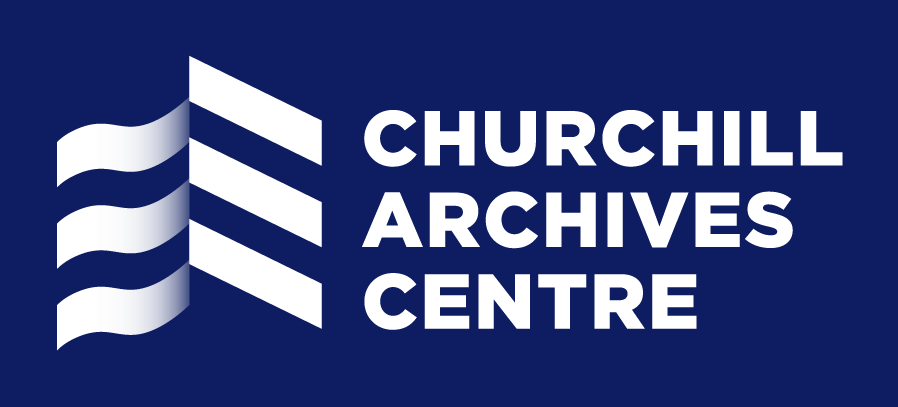Peace Activists and Anti-Nuclear Protesters Research Guide
In this guide, we spotlight the personal papers of a range of individuals who were involved in various anti-nuclear protests and peace campaigns. Anti-nuclear protest took many forms, from organised conferences discussing the dangers of nuclear energy, to non-violent protest within the nuclear disarmament movement.
Much of this research guide will focus on protests against nuclear weapons as this offers a valuable cross-over of anti-nuclear protest and peace campaigning. However, Churchill Archives Centre holds collections relevant to protests against nuclear power too, so anti-nuclear power protesters will also be mentioned. The guide explores members of some of most prominent peace and anti-nuclear organisations in the second half of the twentieth century.
Joseph Rotblat
Professor Sir Joseph Rotblat was a Polish physicist invited by the British Mission on the Manhattan Project in Los Alamos to work on the development of the atomic bomb. When it became apparent by 1944 that Germany was not developing its own atomic weapons, Rotblat left the Project and returned to Britain. Rotblat was a signatory of the Russell-Einstein Manifesto (1955) (RTBT 5/1) and founder of the Pugwash Conferences on Science and World Affairs in 1957 which became an annual conference for scientists concerned about the role of nuclear weapons in international relations (RTBT 5). Professor Rotblat was an active peace campaigner and played a key role in many peace organisations (both anti-nuclear and otherwise).
The Papers of Joseph Rotblat include his anti-nuclear publications (RTBT 6) and his personal correspondence with many of the peace organisations he was associated with throughout his lifetime (RTBT 11/1/2).
Highlights include Rotblat’s correspondence with The Bulletin of the Atomic Scientists, and with the Campaign for Nuclear Disarmament. Further details of the peace organisations of which Rotblat was a member can be found in RTBT 10.
Michael Ashburner
Dr Ashburner was a student at Churchill College between 1964 and 1978, and later Professor of Biology at the University of Cambridge. Dr Ashburner was a member of the Campaign for Nuclear Disarmament (CND), and his personal papers include a large collection of publications produced by CND and other nuclear disarmament groups. A significant proportion of these publications are associated with Christian peace groups, including booklets produced by the Christian Campaign for Nuclear Disarmament in ASHB 27.
Highlights include a CND songbook, and Bertrand Russell’s ‘History of the World: in epitome’ (ASHB). The collection is a great example of the educational publications produced in the early years of CND (from 1958).

Michael Ashburner’s leaflets and printed ephemera, 1950s-60s, ASHB.
Phyllis Willmott
Phyllis Willmott was a social researcher who kept a detailed diary for most of her life. Amongst other things, the diaries offer insight into the experiences of female peace campaigners during the early 1960s. Phyllis Willmott was a member of the Committee of 100, a protest group founded by Bertrand Russell (with signatories of many other prominent figures) in 1960. The Committee of 100 favoured nonviolent direct action in their protests against nuclear weapons.
Highlights include references to the Campaign for Nuclear Disarmament’s Aldermaston March in Phyllis Willmott’s 1961 Diary (WLMT 1/20), and descriptions of the Committee of 100 protests in her 1961-1962 Diary (WLMT 1/23).

Photograph of Phyllis Willmott (courtesy of Lewis Willmott).
Edward Crisp Bullard
Sir Edward Crisp Bullard was a student, and later fellow, at the University of Cambridge, obtaining his PhD in physics and atomic physics under the direction of Ernest Rutherford and Patrick Blackett in 1932. Bullard’s interest in atomic physics extended to research on nuclear waste disposal, and he took part in negotiations for a nuclear test-ban treaty. As a scientist and anti-nuclear campaigner Bullard attended the Pugwash Conferences (BLRD F.75-F.81) with a primary focus on the impacts of nuclear technology on the natural environment. Bullard also served on government disarmament committees, including the Arms Control and Disarmament Panel (BLRD E.38-E.48).
Highlights of his collection include the 1965 papers of the ‘Working Group on Proliferation’, intended to advise the Minister of State for Disarmament (BLRD E.38).
Martin Ryle
For much of his early career, Sir Martin Ryle was based at the University of Cambridge’s Radio Astronomy Group. Following his successful physics career, for which he won the Nobel Prize for Physics in 1974, Ryle became primarily concerned with the ethical uses of science. He campaigned against nuclear weapons and nuclear energy, advocating for other forms of green energy instead.
Highlights include information regarding the activist organisations Ryle was a member of between 1977 and 1984, including the Peace Campaign at the University of Cambridge, 1981 (RYLE E.157) and Scientists Against Nuclear Arms Campaign (RYLE E.158). For further information about the role of scientists in anti-nuclear campaigning, see the Pugwash Conferences, referenced in RYLE E.156 and in Joseph Rotblat’s collection (RTBT 5). See also NBKR 5 and BLRD F.75-F.81.

Astronomer Martin Ryle and television presenter Raymond Baxter, 1960, RYLE K.115.
Philip Noel-Baker
Philip Noel-Baker was an active peace campaigner. He played an important role in the formation of the League of Nations and helped to draft the United Nations charter after the Second World War. Noel-Baker won the Nobel Prize for Peace in 1959 and co-founded the World Disarmament Campaign with Fenner Brockway in 1979. His papers include a large quantity of files relating to Peace and Disarmament (NBKR 5). As an active peace campaigner Noel-Baker was in correspondence with other anti-nuclear campaigners, including several female peace campaigners.
Highlights include NBKR 5/64 which includes correspondence between Noel-Baker and Quaker peace campaigner Elisabeth Rotten regarding disarmament, and NBKR 5/21 which includes Noel-Baker’s correspondence with the ‘Women for Disarmament’ group in 1976.

Women for Disarmament correspondence in the papers of Philip Noel-Baker, NBKR 5/21/2.
Fenner Brockway
Fenner Brockway was a lifelong peace activist. His papers at Churchill Archives Centre include speeches, diaries, press cuttings and correspondence, much of which relate to his anti-nuclear protest. In 1979, in his late 80s, Brockway founded the World Disarmament Campaign with Philip Noel-Baker (NBKR). The Campaign was officially launched in response to the First United Nations Special Session on Disarmament and was in opposition to all nuclear weapons and the theory of deterrence.
Highlights include FEBR 4 which details the founding of the World Disarmament Campaign between 1976 and 1982, including correspondence and organisational papers.

Fenner Brockway, FEBR 7/69.
Enoch Powell
Among other outspoken opinions, Enoch Powell was a vocal advocate for nuclear disarmament. Powell’s opinion of nuclear weapons shifted over his parliamentary career, concluding that nuclear weapons were not a necessary component of British defence policy. Powell came to support unilateral nuclear disarmament by 1982. Powell campaigned against nuclear weapons throughout the 1980s, particularly in the lead up to the 1983 General Election. Highlights include correspondence regarding his support for disarmament between 1982 and 1987 (POLL 3/2/1/42).
By Katie Crowfoot, Casual Archives Assistant.
For a PDF version of this guide, please click here.

